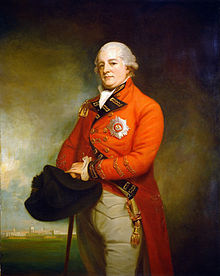Archibald Campbell (officer)

Archibald Campbell , KB (born August 21, 1739 in Inveraray , Scotland , † March 31, 1791 in London ) was a British politician, officer and governor of various colonies.
resume
Archibald Campbell studied at the University of Glasgow and then attended the Royal Military Academy Woolwich . In 1758 he was assigned to the Royal Engineers (pioneers) with whom he participated in the French and Indian War in North America. He was wounded during the siege of Quebec . Campbell was also used in Europe and the Caribbean during the Seven Years' War . In the course of his military service he rose to major general.
In 1768 he took over the technical management (chief engineer) of the British East India Company in Bengal . He supervised the expansion of Fort William in Calcutta . During his time there (1768–1773) he laid the foundation for his fortune. He invested in shipbuilding and was involved in the silk trade. With part of the money he bought some land in his Scottish homeland. After returning home, he began a political career. Between 1774 and 1780 and again from 1789 to 1791 he represented the Scottish constituency of Stirling Burghs in the House of Commons in London.
At the outbreak of the American War of Independence he was ordered there in 1776. His ship was boarded by the Americans in Boston Harbor and he remained in their hands as a prisoner until 1778. Nevertheless, he kept his mandate in London, where he was represented by his brother James Campbell (1737-1805). On May 6, 1778 Archibald Campbell was released from prison as part of a prisoner exchange. Half a year later he marched with a unit of 3,000 men to Georgia , where he took part in the successful battles in the capture of the city of Savannah and Augusta . Between December 29, 1778 and July 1779, he exercised over the part of the Province of Georgia that remained with the British from the office of military governor. In July 1779 Jacques Marcus Prevost succeeded him while Campbell returned to the British mainland.
From 1781 to 1784, Major General Archibald Campbell served as governor of Jamaica . From there he initially supported the British war efforts in the American War of Independence, which had now become futile. He also raised local troops to deal with a possible French invasion that did not materialize. After returning home from his Jamaica mission, Campbell was awarded the Order of the Bath .
From 1786 to 1789 Campbell held his last office as colonial governor. This time he was entrusted with the management of Madras . There he was also the highest military commander. His time there was comparatively calm. After a war that ended before his arrival, there were no significant incidents until the end of his term in office.
Back at home he was again a member of the lower house. He also acquired a residence in London. He died on March 31, 1791 of complications from a cold that he caught while in Scotland. Since 1779 he was with Amelia Ramsay (1755-1813), a daughter of a court painter to King George III. , Allan Ramsey , married. The marriage remained childless. Both Archibald Campbell and his wife were buried in Westminster Abbey in the Poets' Corner near the grave of George Frideric Handel .
Web links
- Campbell in the New Georgia Encyclopedia
- Campell at the Georgia Historical Society
- Online article on Campbell
| predecessor | Office | successor |
|---|---|---|
| James Wright | Governor of the Province of Georgia 1778–1779 |
Jacques Marcus Prevost |
| John Dalling | Governor of Jamaica 1781–1784 |
Alured Clarke |
| George Macartney | Governor of Madras 1786–1789 |
William Medows |
| personal data | |
|---|---|
| SURNAME | Campbell, Archibald |
| BRIEF DESCRIPTION | British politician and general; Governor of Georgia, Jamaica and Madras |
| DATE OF BIRTH | August 21, 1739 |
| PLACE OF BIRTH | Inveraray , Scotland |
| DATE OF DEATH | March 31, 1791 |
| Place of death | London |